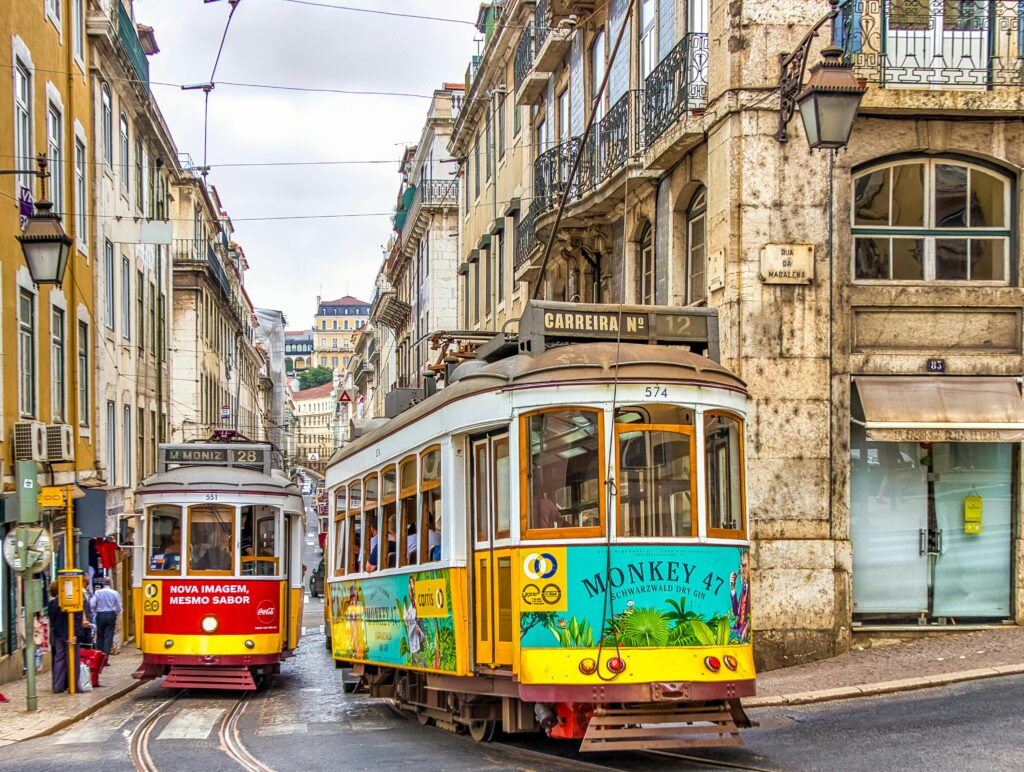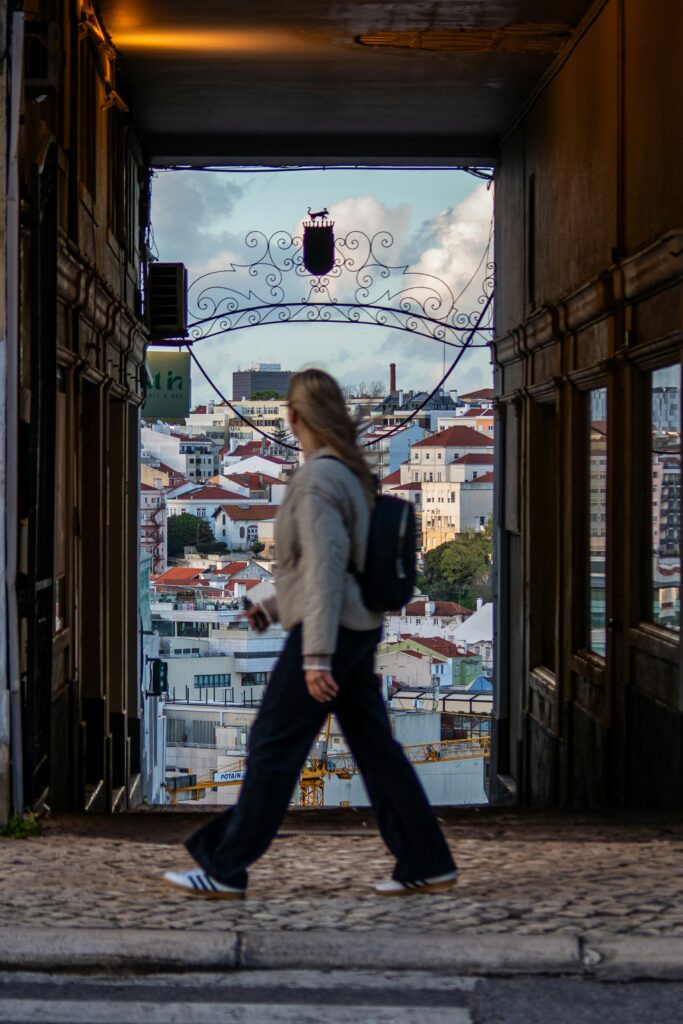It’s often said that Lisbon is “perched” upon its seven hills. But the city rather spills over them, cascading down their sides and collecting at their bases before climbing up again. The Portuguese capital simply has too much energy. Yet its thrumming spirit often gets buried under visual and cultural stereotypes: trolleys, cobblestone strolls, melancholy guitar tunes, and Insta-friendly pastéis de nata (egg tarts). Overlooked are the sudden whiffs of jasmine and raucous queer dance parties, the glittering tiled interiors and hedonistic tales of queer rebellion. Queer visitors, thankly, have the opportunity to get past the stereotypes about Lisbon, which has a metro population of more than three million.
Though it was not the first European country out of the gate when it comes to LGBTQ+ rights, Portugal has become one of the most progressive European countries. Equal marriage was legalized in 2010, and adoption by same-gender parents has been legal since 2016. Beyond that, this diminutive western neighbour of Spain boasts some of the strongest anti-queer discrimination laws on the planet. Though the country does not recognize nonbinary as a gender, it bans conversion therapy and provides access to gender-affirming care.

Portugal hasn’t always been a queer utopia. Until the Carnation Revolution of 1974 toppled the country’s long-running dictatorship, queerness in Portugal was vehemently persecuted; LGBTQ+ people and culture stayed underground. Post-dictatorship, the Catholic church, particularly in rural areas, slowed progress until the early 2000s. That said, even before the amazing strides made in the last couple of decades, overt homophobia in Portugal has been rare, violence uncommon. A 2022 survey found that 86.1 percent of Portuguese people support the rights of gay and lesbian people to live freely.
The Portuguese capital is particularly open-minded. Lisbon prides itself on its warm and celebratory atmosphere, welcoming all travellers onto its sloping stone streets. It’s a city with a confident sense of style that’s simultaneously historic and trendy. Though you’ll find global brands in the pedestrian district of Baixa de Lisboa, a surprising number of businesses in the centre are proudly and intriguingly indie.
Yes, Lisbon is a popular destination these days. But skip the influencer-mobbed Tram 28 and Elevador Santa Justa, hopping instead on Tram 18 for a quiet scenic ride to lovely upper Belém or Tram 24, from Chiado to Bairro Alto and Príncipe Real, which comprise the queerest corners of the city. In Chiado, one can also try fresh and flaky pastéis de nata at the Bairro Alto Hotel’s bakery, a local favourite that lies far from the fussy, famed (and perhaps a tourist trap?) Pastéis de Belém (R. de Belém 84 92, Lisboa). Pair these with a bica (expresso) and head to As Salgadeiras (R. das Salgadeiras 18, 1200-396) in Bairro Alto for a traditional bacalhau (cod) dinner.

Lisbon is a city with a rhythm all its own, and it’s after dinner when Lisbon truly hits its stride. The narrow pathways of Bairro Alto transform into a network of open-air bars dripping in cheap drinks. While the Príncipe Real entertainment district is calmer and dare we say more chic, it becomes just as busy and buzzy around midnight, when Lisbon’s revellers pack into its bars and clubs. Meanwhile, the eastern neighbourhoods of Intendente and Graça are where visitors will find queer and genderless bars as well as creative collectives, providing a more raw and authentic vision of Lisbon’s queer present and future.
For a traditional tourist experience, you should answer the siren call of the famed lower Baixa district, with its grand Praça do Comércio and shop-lined streets of blue-tiled buildings. You’ll find plenty to marvel at, including the internet-famous Pink Street, which attracts, it seems, drag queens on roller skates. Winding up the neighbouring hill, you’ll find the historic Alfama district and its narrow, snaking cobblestone streets that culminate in the iconic São Jorge Castle.
Visitors who are willing to travel even farther outside of Lisbon’s centre can consider GalaCriCri, a decadent and unforgettable celebration of cabaret and dance that takes place in a century-old palace. Overdressing is mandatory. Madonna attended when she lived in Lisbon pre-Covid.
For an equally legendary party, time your visit for June and catch Lisbon Pride, which is more of a community affair than a corporate-sponsored Speedofest. In 2025, Lisbon hosted EuroPride, which is awarded annually to a European city who wants to make a continental impact. During Pride, the city’s streets pulsate with both joy and protest. Just remember that the country’s progressive drug laws are lax on possession but tough on distribution—even among close friends and romantic partners. This means that you could get in trouble for sharing a joint with a friend, but not for smoking one passed to you. The latter would just earn you a reprimand.
Even beyond the Pride season, organizations like Queer Art Lab offer a deluge of queer programming throughout the year, organizing workshops, chats and meetups that lift up local queers. Lisbon’s robust support of the queer community is partly responsible for the success of establishments like Alex’s Queer Lisbon History Tour, which delights visitors with fabulously detailed stories of LGBTQ+ history while providing each participant with a long list of local queer resources.

Lisbon is more than a budget Barcelona or a casual Berlin. The energy is more subdued, but also more profound. It’s here where Fernando Pessoa, one of Portugal’s most celebrated writers, bemoaned his own queer (and sexless) life, codifying it in epically melancholic poems and essays, read and resented by high school students the world over.
Lisbon is also where one moment, you might be chatting with a cute dancer in a taberna, only to wind up 15 minutes later at a magnificent dance party. Lisbon is intimate enough to feel like a village, all-encompassing enough to feel like an ecosystem. It has endured dictatorship, revolution, Inquisition, gentrification and Madonna. As Gia Gunn of Drag Race fame might say, there’s room for everybody. Here is our insider’s guide to the best of LGBTQ+ Lisbon.
Pride
Lisbon Pride (typically mid-June; TBA in 2026). This multi-day celebration usually includes performance stages, a “village” with vendors and food, and a parade. Hosting EuroPride in 2025 helped the organization take it up a notch or two.
What to see and do
Igreja de São Roque (Largo Trindade Coelho, Lisboa). While it’s known among heterosexuals for its splendorous gold embellishments, the Church of Saint Roch is known among queer local tour guides for being the site where two closeted men once hooked up during the Inquisition, “spilling their seed” at a now-infamous altar that you can visit. The church’s art museum was one of Portugal’s first.
Castelo de São Jorge (R. de Santa Cruz do Castelo, Lisboa). This 11th-century Moorish castle, built on Roman fortifications that date back to the sixth century, provides sweeping views of the city from its hilltop perch. The local (and vocal) peacocks are a great bonus.
Tasca do Chico (R. do Diário de Notícias 39, Lisboa). This is widely considered the best place to hear fado, Portugal’s famously melancholy music export. Visitors should also see if Fado Bicha (“Fado Faggot”) is playing anywhere in the city. This queer duo taps into fado’s historical origins as the music of Portugal’s marginalized—sex workers, immigrants and queers.
Jerónimos Monastery (Praça do Império, Lisboa). Take advantage of the 15th-century Gothic church’s free entry and skip the cloister, which, though beautiful, is best seen from the outside and suffers from painfully long lines.
LX Factory (R. Rodrigues de Faria 103, Lisboa). This former 19th-century textile factory has been reimagined as a creative collective featuring studios, boutiques, bookshops and restaurants, all surrounded by provocative street art.
Museu Medeiros e Almeida (R. Mouzinho da Silveira 4, Lisboa). Housed in a former mansion, this is a great place to spend an afternoon admiring art, jewellery, silverware and European paintings.
Museu do Aljube—Resistência e Liberdade (R. Augusto Rosa 42, Lisboa). This unassuming museum provides an inspiring and sombre look into Lisbon’s revolutionary past.
MAC/CCB—Museum of Contemporary Art and Architecture Centre (Praça do Império, Lisboa). With works by Andy Warhol, Francis Bacon, Pablo Picasso and Salvador Dalí in its permanent collection, and temporary exhibits that frequently include queer themes and artists, this is a must-stop for culture vultures. Plus you get the architecture centre.
Tram 28 and Tram 18. Lisbon is renowned for its trolleys, and Tram 28 is the most iconic thanks to its scenic route through the city’s main historic sights; however, it’s also constantly packed, making it difficult to enjoy a view. For an equally scenic ride that ends in the lovely town of Ajuda, take Tram 18.
Alfama. Perhaps the best neighbourhood for casual sightseeing, Alfama conceals some of Lisbon’s most historic buildings, including the Sé Cathedral, the Panteão Nacional, the Igreja de Santo António and (if you’re willing to walk to the top) the Castelo de São Jorge. The labyrinth of cafés and independent shops is the cherry on top.
Palácio Nacional da Pena/Sintra. About an hour train ride from Lisbon’s Estação de Comboio de Campolide, the Parque Natural de Sintra-Cascais and the surrounding area is we’ll you find monumental and whimsical architecture delights like the 19th-century palace Palácio Nacional da Pena, Parque e Palácio de Monserrate, Castelo dos Mouros and Quinta da Regaleira. Each attraction has its own admission price and hours, but you can walk around the park and see most of them from a distance for free. An easier method is to sign up for a half-day or day tour with a tour company.
Where to stay
Late Birds Lisbon (Tv. André Valente 21, Lisboa). Tucked in a lovingly restored 18th-century estate in Bairro Alto, Late Birds offers a stylish and all-male experience among its verdant garden and tranquil pool. Its curated social events make it an excellent choice for solo gay travellers.
Rainbow Guest House (3rd floor, 25 Alameda Dom Afonso Henriques, Lisboa). Though just outside the city centre, this budget-friendly stay aims to lure queer travellers. It’s pretty basic, but the price point is decent and there’s a garden; some of the rooms have city views from balconies.
Hotel Villa 3 Caparica (R. Teresa Leitão Barros 4, Charneca de Caparica). Though it’s in a suburban municipality outside the city centre, this clothing-optional gay resort is conveniently located near Praia 19, the “gay beach.” The property is centred on the pool and has a sauna, gym, steam room and Jacuzzi. They occasionally host pool parties and drag shows and more importantly, barbecues. Day passes for the pool and sauna areas are available.
Selina Secret Garden (R. Fernandes Tomás 66, Lisboa). Though this laid-back Lisbon edition of an international hostel chain isn’t explicitly queer, you’ll find that plenty of your fellow guests are on Grindr. There’s a shared kitchen and a pool, as well as fitness and entertainment programming. Some private rooms are available.
Pestana Palace Lisboa (R. Jau 54, Lisboa). If you’re looking for luxury but don’t necessarily want queer AF realness, then stay in this five-star converted 19th-century palace. The urban resort has two swimming pools, indoor and outdoor, a spa and lush gardens that are a tourist attraction themselves. Near both Jerónimos and LX Factory.
Where to eat
Manny’s Place (R. da Barroca 92, Lisboa). The delicious small plates are perfect for sharing with a date or with friends, but the riotous drag shows (every Tuesday through Sunday) are what really set it apart.
Time Out Market (Mercado da Ribeira, Av. 24 de Julho, Lisboa). For a true smorgasbord of international cuisine, visit this riverside foodie destination and then people-watch your heart out. Here, you can find gourmet burgers next to traditional Portuguese fare cooked by nationally famous chefs.
Solar dos Presuntos (Junto ao Elevador do Lavra, R. das Portas de Santo Antão 150, Lisboa). The relaxed home-style décor of this family-run restaurant is misleading. They serve high-end seafood with first-class service.
A Primavera do Jerónimo (Tv. da Espera 34, Lisboa). If you’re hankering for traditional Portuguese cuisine but have already burnt through your day’s budget, consider this no-frills queer-friendly establishment that’s located near the city’s best nightlife. Bi icon Josephine Baker once visited and her photo is on the wall.
Bistro Edelweiss (R. de São Marçal 2, Lisboa). Like its namesake, this gay-owned Swiss bistro is clean and bright, and happy to meet you. The fondue and raclette often get glowing reviews.
Where to party
Bairro Alto is filled with queer and queer-friendly street drinkers throughout the night, but those same partiers often head to the chicer Príncipe Real district for a traditional late-night club experience. Outside the main part of Lisbon, Intendente and Graça comprise much of the alternative scene.
GalaCriCri (1 Calçada do Duque de Lafões, Lisboa). A queer costume party for the ages. Admire the surreal decor, savour the historic venue, and lose yourself in the dance.
Bar 106 (R. de São Marçal 106, Lisboa). Established in 1990, this dependable little gay bar is friendly; customers are known to sing along with whatever’s playing.
Bar Tre3s (R. Ruben A. Leitão 2A, Lisboa). Voted one of the world’s best bars, this dimly lit pup, which has big windows that look out onto the street, often has a crowd spilling into its doors by 11 p.m. Despite the bar’s unofficial motto—“you are a bottom”—you won’t be scraping the bottom of the bear-el here. Near Principe Real.
Shelter Bar (R. da Palmeira 43 A, Lisboa). A quieter and cushier alternative to Bar Tre3s (and just a three-minute walk away), Shelter is the queer bar equivalent of a giant bear hug, but with a roster of cool DJs.
Side Bar (R. da Barroca 33, Lisboa). As soon as you see this tight little hole (in the wall) in Bairro Alto, you’ll want to enter. Well-hung with mirror balls and neon pink lighting, it packs a major punch for such a tiny space.
Friends (Travessa da Água da Flor 17, Lisboa). A well-styled, lively bar in Bairro Alto with a youngish crowd and good pop music taste.
Purex (R. das Salgadeiras 28, Lisboa). Popular among Lisbians™, Purex is a combination bar-dance floor in Bairro Alto that pairs popular music with 1970s-esque décor.
Finalmente (R. da Palmeira 38 R/C, Lisboa). Dubbed “finally” because people used to end their nights at its 3 a.m. drag show, Finalmente has since added an earlier drag show at 10:30 p.m., for those just starting their night out. The intimate show provides a nice mix of standards and surprises.
Construction (R. Cecílio de Sousa de 70, 1200-101 Lisboa). One of Lisbon’s top dance spots, Construction caters mostly to 30+ queers looking to cruise. There are strippers and assorted club shows.
Posh Club Lisbon (R. de São Bento 157, Lisboa). The second of Lisbon’s queer dance club trilogy is Posh, which straddles the line between the cruising daddy vibe of Construction and the twinkiness of the third, Trumps.
Trumps (R. da Imprensa Nacional 104B, Lisboa). Named for the card game (not for that other distracting gameplayer), this thumping disco with two dance floors caters to mostly younger partiers and is the largest gay club in Portugal.
Drama Bar (R. Damasceno Monteiro 75B, Lisboa). A bit outside Lisbon’s centre, Drama Bar is worth the cheap Uber ride for its burlesque shows, bingo nights, regular drag performances, Lisbian-heavy crowd and capacious basement. Opened in 2023.
Where gay and bi guys can find fun
Trombeta Bath (R. do Trombeta 1C, Lisboa). This Bairro Alto sauna is Lisbon’s largest, with a diverse and friendly clientele ready to bring the heat.
SaunApolo 56 (R. Luciano Cordeiro 56 A, Lisboa). This “hetero-friendly” sauna, run by a trans activist and entrepreneur (read the Pink Ticket Travel profile here), harbours a mix of genders and orientations within its sleek, tiled walls.
Bar Cru (Calçada Eng. Miguel Pais 39, Lisboa). This men’s nudie and fetish bar/sex club makes for a remarkably casual cruise, and once you’re done cruising men you can cruise the erotic shop’s fetish and underwear selections.
Drako Club (R. Nogueira e Sousa 11, Lisboa). Lisbon’s largest male-only naked cruising club comes complete with swings, playrooms and an on-site sex shop.
Praia 19 (Costa da Caparica, 30 mins. south of Lisbon by car). Costa da Caparica boasts 20 numbered beaches among its continuous 30-kilometre arc of Atlantic Ocean sand dunes. However, 19 is by far the queerest. It’s clothing-optional and contains the busiest dunes, if you get our drift.
Where to shop
Feira da Ladra (Campo de Santa Clara, Lisboa). Lisbon’s largest and most famous market takes place only on Tuesdays and Saturdays. Among the usual cheap souvenirs and discounted boutique finds, you’ll discover queer gems like homoerotic comic books and Pride memorabilia.
Livraria Bertrand (R. Garrett 73 75, Lisboa). Founded in 1732, this is the oldest continuously running bookstore in the world. Unsurprisingly, Livraria Bertrand has some queer selections on its shelves. As a bonus, you can get your book stamped with a message saying you’ve been here.
Greta Livraria (R. Palmira 66C, Lisboa). This feminist bookstore has a good LGBTQ+ selection (mostly in Portuguese). They also host book-related events.
Isto (Praça do Príncipe Real 26, Lisboa). Just south of the Botanical Gardens, where closeted gay men once secretly “encountered” each other during Portugal’s homophobic dictatorship, you can now buy chic luxury essentials at this men’s boutique.
Avenida da Liberdade. For a brush with global luxury brands—and the fancy people who love them—take a walk down this wide boulevard from Parque Eduardo VII to Praça dos Restauradores. Rua do Carmo is where to start looking for more middlebrow global brands.


